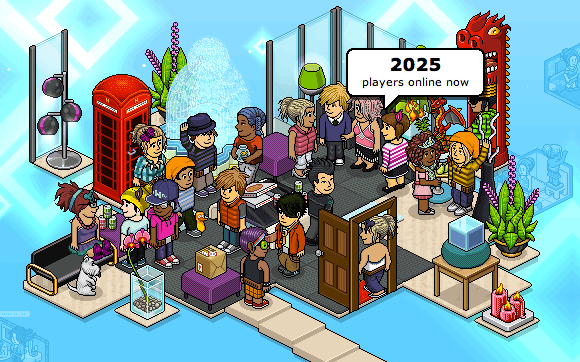Habbo Hotel, the under-21 social networking site that was forced to close down earlier this month after it was revealed that people were using it to send sexual and other illicit messages to underage users, is now open once again, TechCrunch has learned.
Sulake, the Finnish company that owns Habbo Hotel, two weeks ago “muted” activity on the site as it scrambled to implement better content and safety controls and call for user feedback after an investigative report from the UK broadcaster Channel 4 revealed the extent of the problem. The mess saw VC firm Balderton walk away from its 13 percent stake in the company. Today, the site is un-muted in Finland, Spain and Brazil to test out those new controls, with further markets coming online in “coming weeks,” said a spokesperson.
Paul LaFontaine, CEO of Sulake, says that Spain and Brazil are two of Habbo’s most popular in terms of active users. “This will provide a representative sample of users on which to verify the improved safety of our systems as we aim to bring other markets back online,” he said in a statement.
The company has outlined a number of changes to the site — which in the past required the most basic of sign-ups to become active. Some 60 percent of users on the site are registered to be between the ages of 13 and 16. Together there were 9 million monthly unique users on the site before the scandal hit.
The company has put in a much stronger algorithm to monitor for dodgy content. It only calls the algorithm “basic level” at this point but says it is working on expanding this with a “selected supplier.”
And users must now complete a “responsible use test” before they are unmuted, Habbo says; this will come in the form of a questionnaire and accepting new terms and conditions for use. Once users are unmuted, they will only be on a limited service and have to work their way up through responsible interaction.
In addition, there are new tracking measures on the site “to clearly tie all virtual interactions to real user identities,” the company notes. In the chatrooms, there will be more moderators around to keep conversation from getting out of hand. And users able to volunteer as “Guardians,” or in Habbo’s terminology a “virtual police force,” to prove additional community support.
Those seeing dodgy content can now also hit a more clearly marked emergency button.
All in all, the company is pretty humble — and does leave some questions for others that manage online kids content about what they are doing. “We are aware that this list of measures does not provide a comprehensive solution to the safety challenges faced by social gaming sites,” LaFontaine said in the statement.
It’s also playing with a lot at stake here. One estimate puts Sulake’s revenues from Habbo at $50 million annually, although with the scandal and the temporary closure it remains to be seen whether users and advertisers continue to stick with the site.
